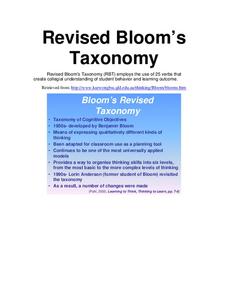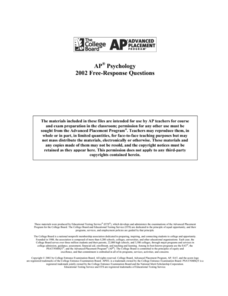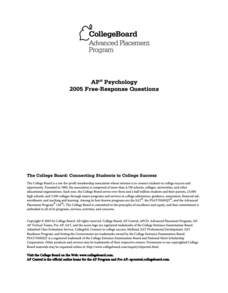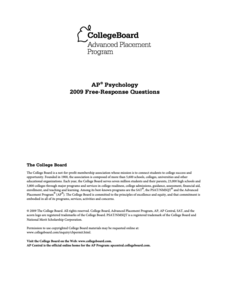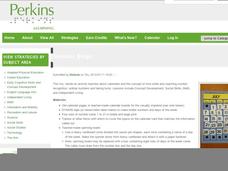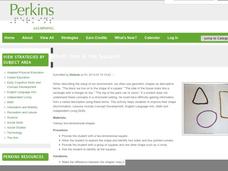Universiti Tunku Abdul Rahman
Revised Bloom’s Taxonomy
For decades Bloom's Taxonomy has helped to guide educators' approach to instruction, but as times change and students change, so too must the methods for teaching evolve. Introducing teachers to the new revised Bloom's Taxonomy, this...
University of Maine
Don’t Fall Into the Thinking Trap
The final lesson in a three-part healthy living series has class members examine five thinking traps that distort how they perceive themselves and/or situations. They also learn strategies that help stop the downward spiral and get them...
American Museum of Natural History
Trip Up Your Brain
Sometimes different parts of the brain disagree. See what this disagreement looks like using a remote learning resource to experience how brains often take shortcuts. Pupils complete the activity, observe their results, and then read...
American Museum of Natural History
Brain Power
Did you know it's possible to train your brain to work better? Learners use brain games to try to do just that. The games test vision and memory and give them the opportunity to improve their scores. The lesson works as an in-class...
College Board
2002 AP® Psychology Free-Response Questions
A child tells a story of her visit to a fire house. How does her cognitive development impact how she remembers what she saw? Scholars explore a case study and a second prompt about psychological reactions using authentic College Board...
College Board
2003 AP® Psychology Free-Response Questions
Intelligence testing can be a useful tool—but what are its limits? Scholars explore the question, considering issues such as the role of bias, using authentic College Board materials. Learners also examine the psychological factors...
College Board
2005 AP® Psychology Free-Response Questions
How can diagnostic labels help children? Is hypnosis a useful tool or a fraudulent practice? An examination prompt explores controversies in psychology. A second, structured inquiry unpacks perception—and its various influences.
College Board
2009 AP® Psychology Free-Response Questions
Learners examine how psychological factors influence competitors at a dance contest, using materials from College Board.
College Board
AP® Psychology Cognition and Language
I can remember what happened five years ago, but I can't recall what I did last week! High school psychology students analyze how memory, cognition, and language impact one another. Hands-on activities, memory exercises, and research...
American Psychological Association
Using Psychological Perspectives to Answer Questions on Behavior
Perspective is everything when it comes to assessing human behavior. Class members examine a series of statements and identify the perspective represented by each to demonstrate their understanding of different psychological perspectives.
Council for the Curriculum, Examinations and Assessment
Health and the Whole Person
Health is more than measuring your blood pressure and eating nutritious foods. Eighth graders discuss the factors that play into an individual's health, including spirituality, social life and friendships, emotional stability, cognitive...
Danya International, Inc.
Life Journey through Autism: An Educator’s Guide to Asperger Syndrome
Whether this the first time you've had a learner with Asperger Syndrome in your class, or you have years of experience with learners on the autism spectrum, a booklet about the best ways to accommodate these kids in the classroom could...
Iowa State University
A Model of Learning Objectives (Revision of Bloom's Taxonomy)
What would a three-dimensional representation of Bloom's revised taxonomy of the cognitive domain look like? Get a glimpse of the complex classification system that is frequently referenced in education to distinguish levels of learning.
Perkins School for the Blind
Calendar Bingo
While this activity was designed for students with special needs, it could be used with any group learning about the calendar or days of the week. Old calendar pages become the bingo board, and numbers 1 through 31 become the numbers...
Perkins School for the Blind
Where Shall I Put It?
Position and positional phrases are concepts that need to be constructed for learners with low or no vision. Help them gain competence and a conceptual understanding of words like on, in, and under with a funny game. After gathering a...
Perkins School for the Blind
Which One is the Square?
Children who are blind need to constantly be engaged in building conceptual understandings of the world around them. This activity will help them grasp the concept of shape, identify shapes, and consider shapes as they are used to...
Perkins School for the Blind
Mix and Match
Sorting and matching are skills that have all kinds of applications. Learners with low, but useable vision work to match an object to an object, an object to a picture, and a picture to a picture. This will help them identify objects...
Perkins School for the Blind
Following Directions
Turn the act of following directions into a fun and engaging game! Especially designed for young scholars with cognitive or intellectual disabilities, this instructional activity uses a game format as a natural reinforcer. Write a set of...
Perkins School for the Blind
Treasure Hunt
On, over, and under are some very common prepositions; but how can you teach these concepts to children with visual impairments? Here, is one way. Kids will practice following verbal commands as they go on a classroom treasure hunt. They...
Perkins School for the Blind
What Would You Do If...?
What would you do if...? That's a great question, and, when posed to learners with visual impairments, a question that can foster concept development and speaking and problem-solving skills that relate to real-life situations. The...
Perkins School for the Blind
Silly or Sensible?
Is it silly or sensible? That's a great question, and it's the question that will drive this entire lesson. Learners with special needs and visual impairments work together to analyze verbal information. The instructor makes a statement,...
Perkins School for the Blind
Please Call Me Names!
Teaching students who are blind means teaching them skills a sighted person may take for granted. To practice calling people and objects by name, learners engage in a cueing activity. The child calls for an adult by name, and then uses a...
Curated OER
Exploring Feeling Through Eric Carle
Students construct a "feeling cube" for the purpose of exploring and discussing feelings. Students read "The Hungry Caterpillar" discussing life cycle and making a sock puppet, discussing the feelings explored during the activity and the...
Curated OER
Teaching to Enhance Development and Learning
Students engage in a lesson plan that prepares Preschool Teachers to teach lessons targeted at the development of children in the area of learning. They view a PowerPoint presentation to obtain the new information and the visual learning...


